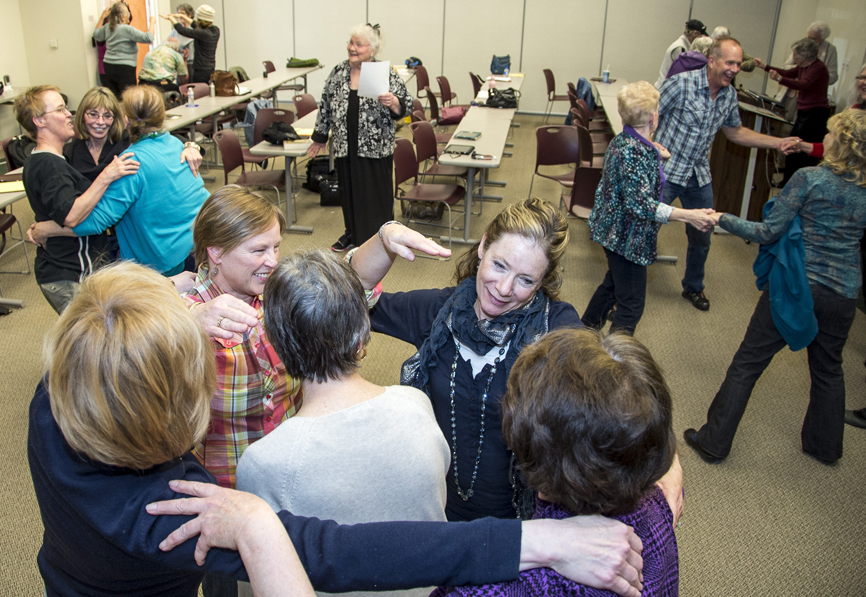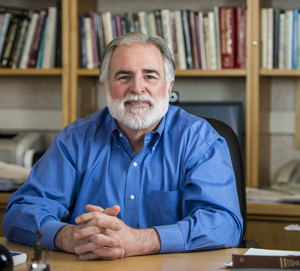- Editorial Offices
- 325 Brantly Hall
- Missoula, MT 59812
- (406) 243-2488
- themontanan@umontana.edu
- Icons By Maria Maldonado
MOLLI breathes new life into continuing education at UM



In the final stretch of spring semester, classrooms across the UM campus are packed. Students and faculty prepare for finals, graduation, and the end of another year. But the peals of laughter ring so loudly from one classroom in the James E. Todd Building that the students within couldn’t possibly be concerned with a test or their grades.
And they’re not. The class is Improvisation: A Great Anti-Aging Device! and the twenty-four community members inside—all age fifty or older—are having a marvelous time acting out instructor Margaret Johnson’s ice-breaker activities.
Groups work together to form a “picture” of a fried breakfast, a washing machine, and a clock. They perform short, impromptu scenes between movie stars and their adoring fans, teenagers pleading with a police officer to not turn them over to their parents, or lawyers and clients having a tense conversation after a lost trial.
“There’s one thing about improv,” Johnson yells out encouragingly as the group tries their latest scene: forming a La-Z-Boy recliner out of about five people and classroom materials. “There’s no right way or wrong way to do it. There’s usually a more interesting way, or a more creative way.”
The class is offered through the Montana Osher Lifelong Learning Institute at UM, better known as MOLLI. Operated through UM’s School of Extended and Lifelong Learning and partially funded by a $1 million endowment from the Bernard Osher Foundation, the program offers a wide range of noncredit, ungraded classes during three terms each year to community members age fifty or older.
MOLLI stands out on campus, not only because of its unique course offerings or nontraditional roster of members, but also because continually growing enrollment numbers have highlighted the program as a popular connection between UM and the community.
The courses are taught by UM faculty, emeritus professors, and professionals in the community. With courses covering everything from fine art to science, MOLLI members keep coming back and spreading the word to their friends. The program now has more than 1,100 members.
MOLLI is the only Osher Lifelong Learning Institute in Montana. It began in 2006 with a push from a passionate corps of community members, and received three $100,000 operating grants from the Bernard Osher Foundation before receiving the full endowment.
“We’re not able to spend from the $1 million,” says Roger Maclean, dean of SELL. “We get an annual interest payment of about $60,000 in operating funds.”
Twenty to twenty-four courses are offered each term, and they are open only to MOLLI members. Members pay an annual fee of $20 and then $60 per class. Additional benefits include privileges from the Maureen and Mike Mansfield Library, a discount at The Bookstore at UM, and access to an array of special events through the program, among others.
MOLLI is run by Maclean, a full-time program manager, and a volunteer advisory council composed of twelve members. Many council members serve on other MOLLI committees and also are MOLLI instructors, students, or both. Marci Valeo, chair of the council’s membership and marketing committee, has been involved with the program since 2008.
“I was drawn by friends and word of mouth,” Valeo says. “It was a different kind of educational opportunity with no tests, no grades, and really optional homework, which was appealing.”
Valeo and many others in Missoula have embraced MOLLI’s offering of education for education’s sake. Without the pressure of tests, members are free to explore different topics and take risks in learning.
“We’re really lucky to have this,” Valeo says. “It’s quite an exciting way to learn more about things and to meet your peers.”
Like Valeo, many members heard about the program from their friends. SELL also markets the program to the community through news releases, advertising, e-blasts, brochures, and the MOLLI website, but the program has grown largely on its own through word of mouth.
UM art history and criticism Professor H. Rafael Chacón serves on the advisory council—as President Royce Engstrom’s appointed faculty member—but Chacón also has been an instructor with the program since its inception.
Chacón got involved with MOLLI because SELL had run some off-campus classes he’d taught, and he enjoyed working with continuing education students who had taken his regular courses through the UM School of Art.
Now, aside from teaching MOLLI courses, he serves as a bridge between the council and the instructors, helping the program continue to draw great faculty members and offer exciting, unique courses.
“I suspect the quality of the instruction is the number one incentive,” Chacón says. “I think we have an avid community of very active retirees, and people who really are here to a large extent because of the University community and all the services and amenities UM provides.
“That intersection of a community that wants more from the University, and the University being able to step up and provide, is really what has made MOLLI a successful program.”
Moving forward, everyone agrees MOLLI is in a great position for continued growth, but also to re-evaluate and grow in a mindful, beneficial direction.
“I think—like every organization and institution in the country—we’re having to become more fiscally aware,” Maclean says. “We’re going through an educational process of saying we’re blessed to have this, but be aware of where the nickels and dimes are. To move this forward for another generation we have to be good fiscal custodians at this time.”
This year, MOLLI launched its first fundraising campaign. With an initial goal of $20,000, donations already have surpassed $30,000, with 28 percent of the membership participating. The extra funds will support the program operations and allow more people to receive tuition waivers or scholarships.
And it seems the more who participate, the better. It’s a special class that excites learners, and at the end of Johnson’s improvisation lesson when she asked her students what they thought of the first day, the entire room responded “Fun!” and gave a hearty round of applause.